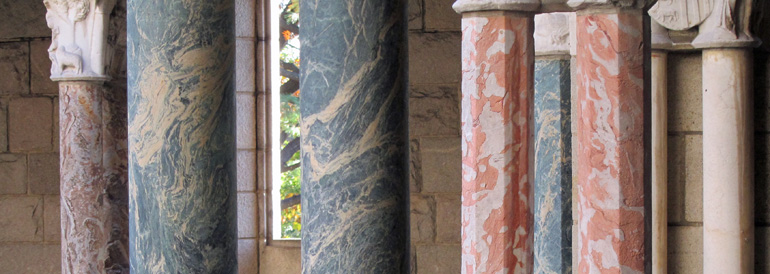Daily Office:
Tuesday, 16 November 2010
Matins ¶ Dominique Browning asks the two questions that plague all consideration of environmental degradation: how is it possible to be hopeful, and what can any one person do? Commendably, she offers no answers. Our own far from comforting thought is that global warming is only the latest of countless ways in which human beings have inflicted pain and misery upon each other. We’re also aware that much of the panic has roots in complacency: most people over fifty grew up without the shadow of a doubt about fossil fuels. The Editor remembers being far more concerned about the exhaustion of fossil fuels — which, one way or another, with more or less inconvenience, will inevitably solve the problem. (Slow Love Life)
Lauds ¶ The Addison Gallery of American Art has been spruced up, with a green wing and revived exhibition spaces, the better to house a collection that is almost uncertainly unparalleled in the world of — prep schools. The Addison, you see, is attached to Philips Andover, in Massachusetts. Karen Wilkin makes it sound extremely enviable, but we’d really be much happier to pick up the Editor’s grandson at the doors of, say, Stuyvesant High and take him through the Metropolitan. Much cheaper. (WSJ; via ArtsJournal)
Prime ¶ With rueful but not unbecoming glee, “Thorstein Veblen” tips us off to Revivial, a new book about the Obama White House that shines a glaring light on its most inexplicable denizen, Larry Summers. (We’re not sure that we’re interested anymore to know what made Mr Summers attractive to the President.) Veblen lists three strikes against the outgoing adviser that the HuffPost piece omits, whether because “ the people who are dishing on Summers now don’t realize these were mistakes, or else they too were on the dumb side of these horrific lapses in judgment which have helped to make Obama the great failed hope of our generation.”
Tierce ¶ At the LRB, Peter Campbell presents a brilliant essay on escalators — specifically, the 4o9 moving stairs that operate in London’s Underground. What causes them to break down? Stuff falling in the 4mm gap between steps, mostly. We sat up sharply at the reminder that the Underground runs for only twenty hours a day — “only.”
Sext ¶ It’s not difficult to imagine how the citizens of a modest Midwestern town would have dealt, 150 years ago, with a raving atheist who insisted on denouncing God from the courthouse steps. Such a lunatic, like Waleed Hasayin in today’s Palestine, would certainly have been locked up “for his own protection.” The analogy is imperfect; a blog does not have the nuisance value of an unwanted orator; no one has to read Hasayin’s diatribes. But the offence is the same: how does a town live with someone who vehemently repudiates its core values, and urges others to do the same? We wonder if our compromise — Hasayin ought to be banished, not punished — would suit anyone involved. (NYT)
Nones ¶ As Robert Reich sees it, the reason that the G20 meeting at Seoul didn’t get anywhere is because of income inequality in China as well as in the United States. Wealth in both countries pools at the top, making exports doubly crucial. For the same reason, each country wants to have the weaker currency, because cheaper exports means greater employment. In theory, that is. In a long and somewhat rambling Times article, Motoko Rich and Jack Ewing report that the weakness of the dollar is unlikely to spur exports/job creation to any very significant extent. For one thing, multinational corporations, wherever nominally headquartered, are designed to play around currency imbalances. We wish that Mr Reich had said more about why he’s opposed to “outright protectionism.” (Christian Science Monitor)
Vespers ¶ Romain Gary (1914-1980) was a writer of many names, so it’s no surprise that one of his best novels, La vie devant soi, has been published under two other names, Momo (that’s how the Editor read it, in English) and Madame Rosa, the latter also the title of the film adaptation starring Simone Signoret — still not out on DVD. La vie devant soi won a second Prix Goncourt for Gary, which was a big no-no — that’s a one-per-customer award. Born Kacew de Gari in Vilnius, Gary signed the book “Émile Ajar,” and got a cousin to do the photo-ops for him. Back in the days when novelists were real men, Gary was a Free French hero; he later ran off with Jean Seberg, and the two made glamorous work of making one another miserable. At the Telegraph, David Bellos writes up the subject of his new biography. (via ArtsJournal)
Compline ¶ Jessica Olien has been living in the Netherlands for a few months now, and she’s scratching her head. “Have we gotten it all wrong?” (Meaning: American women.) Relatively few women work full-time, even when encouraged to do so; and only a quarter of Nederlander women earn enough money to support themselves. Somehow, it seems, the business of making money — a veritable game, if truth be told, for most successful men — has been detached from questions of gender equality. We wonder if it’s really true that Dutch Women Don’t Get Depressed — the title of a book, sadly unavailable, by Ellen de Bruin. (Slate; via MetaFilter; NYT)
¶ Ten centuries of Europe — in five minutes. (GOOD)
¶ How today’s Wii may make tomorrow’s work more fun. (Wired Science)

